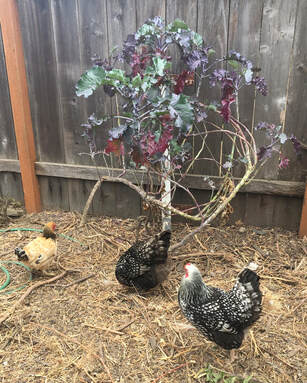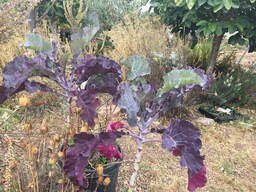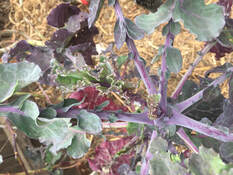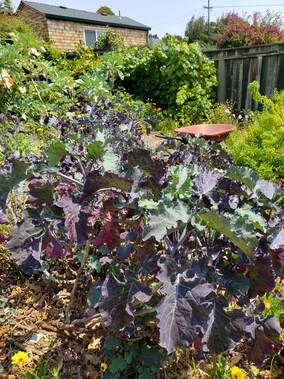About
The history and biological identity of the Perennial Purple Tree Collard seems to be shrouded in mystery, but it is reputed to have come from Africa and have been preserved and passed on within African-American communities in this country. It does not usually flower or make seed. Instead, propagation is by cuttings which are passed along from gardener to gardener. Most likely, African-Americans from the South first brought the Perennial Purple Tree Collard to the San Francisco Bay Area during the WWII-era and the Perennial Purple Tree Collard is intimately linked with the city of Richmond's history.
Proclamation: Official Green of Richmond, California
July 20, 2010
RESOLUTION OF THE CITY COUNCIL OF THE CITY OF RICHMOND DESIGNATING THE PURPLE TREE COLLARD AS THE OFFICIAL GREEN OF THE CITY OF RICHMOND
WHEREAS, the Perennial Purple Tree Collard (Brassica oleracea v acephala) is a hybrid of the cabbage family and the mascot of Urban Tilth, a non-profit organization in West Contra Costa County that promotes urban agriculture our community build a more sustainable, healthy, and just food system, working with schools, community-based organizations, government agencies, businesses, and individuals to develop the capacity to produce 5% of our own food supply, and
WHEREAS, the Perennial Purple Tree Collard represents what Richmond aspires to be – tough, healthy and productive, and
WHEREAS, the Perennial Purple Tree Collard propagated by Urban Tilth was a 12-feet tall mother plant from the abandoned garden at JO Ford Elementary School, and
WHEREAS. the Perennial Purple Tree Collard is the perfect plant for building a healthy foodshed in west Contra Costa County, and
WHEREAS, the Perennial Purple Tree Collard is productive (plants get 6-8 feet tall and 3 to 4 plants and can produce weekly side-dishes for a family of 4 year round), and
WHEREAS, the Perennial Purple Tree Collard is perennial (no need to replant or fuss with like annuals -- just cut back in the winter and watch for new growth each year), and
WHEREAS, the Perennial Purple Tree Collard is tough -- takes neglect and relatively little water. The leaves get tough with no irrigation, but as soon as the winter rains return the plants pop back into delicious shape, and
WHEREAS, the Perennial Purple Tree Collard is delicious (better than standard collards and especially sweet in cold weather), and
WHEREAS, the Perennial Purple Tree Collard is nutritious (not many foods are better for you than collard greens -- ask a doctor or your grandmother), and
WHEREAS, Perennial Purple Tree Collard leaves are rich in calcium (226 mg per cup, cooked), vitamins B1, B2, B9, and C (which may be leached by cooking, however), as well as beta-carotene (pro-vitamin A). They are high in soluble fiber and contain multiple nutrients with potent anti-cancer properties: diindolylmethane, sulforaphane and selenium. Researchers at the University of California at Berkeley have recently discovered that 3,3'-Diindolylmethane in Brassica vegetables such as collard greens is a potent modulator of the innate immune response system with potent anti-viral, anti-bacterial and anti-cancer activity, and
WHEREAS, the Perennial Purple Tree Collard is easy to propagate (just take an 8 inch stem cutting and stick it in moist soil in the winter), and
WHEREAS, The Bay Area strain of purple tree collards gained national fame when Eric Toiensmeier cited them as one of the only decent-tasting perennial brassicas he had ever tried in his book Perennial Vegetables, and
WHEREAS, the history and biological identity of the Perennial Purple Tree Collard seems to be shrouded in mystery, but they are reputed to come from Africa and have been preserved and passed on within African-American communities in this country. They do not normally flower or make seed, and when they do, the seed does not breed true. Instead propagation is by cuttings, which are passed along from gardener to gardener, and
WHEREAS, most likely, African-Americans from the South first brought the perennial purple tree collard to the Bay Area during the WWII-era so the perennial purple tree collard is intimately linked with Richmond's history, and
WHEREAS, tens of thousands of these plants at schools and on the commons in west Contra Costa County could help create a more sustainable, healthy, and just local food system. With purple tree collards, we can literally embed the value of healthy eating within our public landscapes.
THEREFORE BE IT RESOLVED, the City Council of the City of Richmond designated the Perennial Purple Tree Collard as the official green of the City of Richmond.
RESOLUTION OF THE CITY COUNCIL OF THE CITY OF RICHMOND DESIGNATING THE PURPLE TREE COLLARD AS THE OFFICIAL GREEN OF THE CITY OF RICHMOND
WHEREAS, the Perennial Purple Tree Collard (Brassica oleracea v acephala) is a hybrid of the cabbage family and the mascot of Urban Tilth, a non-profit organization in West Contra Costa County that promotes urban agriculture our community build a more sustainable, healthy, and just food system, working with schools, community-based organizations, government agencies, businesses, and individuals to develop the capacity to produce 5% of our own food supply, and
WHEREAS, the Perennial Purple Tree Collard represents what Richmond aspires to be – tough, healthy and productive, and
WHEREAS, the Perennial Purple Tree Collard propagated by Urban Tilth was a 12-feet tall mother plant from the abandoned garden at JO Ford Elementary School, and
WHEREAS. the Perennial Purple Tree Collard is the perfect plant for building a healthy foodshed in west Contra Costa County, and
WHEREAS, the Perennial Purple Tree Collard is productive (plants get 6-8 feet tall and 3 to 4 plants and can produce weekly side-dishes for a family of 4 year round), and
WHEREAS, the Perennial Purple Tree Collard is perennial (no need to replant or fuss with like annuals -- just cut back in the winter and watch for new growth each year), and
WHEREAS, the Perennial Purple Tree Collard is tough -- takes neglect and relatively little water. The leaves get tough with no irrigation, but as soon as the winter rains return the plants pop back into delicious shape, and
WHEREAS, the Perennial Purple Tree Collard is delicious (better than standard collards and especially sweet in cold weather), and
WHEREAS, the Perennial Purple Tree Collard is nutritious (not many foods are better for you than collard greens -- ask a doctor or your grandmother), and
WHEREAS, Perennial Purple Tree Collard leaves are rich in calcium (226 mg per cup, cooked), vitamins B1, B2, B9, and C (which may be leached by cooking, however), as well as beta-carotene (pro-vitamin A). They are high in soluble fiber and contain multiple nutrients with potent anti-cancer properties: diindolylmethane, sulforaphane and selenium. Researchers at the University of California at Berkeley have recently discovered that 3,3'-Diindolylmethane in Brassica vegetables such as collard greens is a potent modulator of the innate immune response system with potent anti-viral, anti-bacterial and anti-cancer activity, and
WHEREAS, the Perennial Purple Tree Collard is easy to propagate (just take an 8 inch stem cutting and stick it in moist soil in the winter), and
WHEREAS, The Bay Area strain of purple tree collards gained national fame when Eric Toiensmeier cited them as one of the only decent-tasting perennial brassicas he had ever tried in his book Perennial Vegetables, and
WHEREAS, the history and biological identity of the Perennial Purple Tree Collard seems to be shrouded in mystery, but they are reputed to come from Africa and have been preserved and passed on within African-American communities in this country. They do not normally flower or make seed, and when they do, the seed does not breed true. Instead propagation is by cuttings, which are passed along from gardener to gardener, and
WHEREAS, most likely, African-Americans from the South first brought the perennial purple tree collard to the Bay Area during the WWII-era so the perennial purple tree collard is intimately linked with Richmond's history, and
WHEREAS, tens of thousands of these plants at schools and on the commons in west Contra Costa County could help create a more sustainable, healthy, and just local food system. With purple tree collards, we can literally embed the value of healthy eating within our public landscapes.
THEREFORE BE IT RESOLVED, the City Council of the City of Richmond designated the Perennial Purple Tree Collard as the official green of the City of Richmond.




